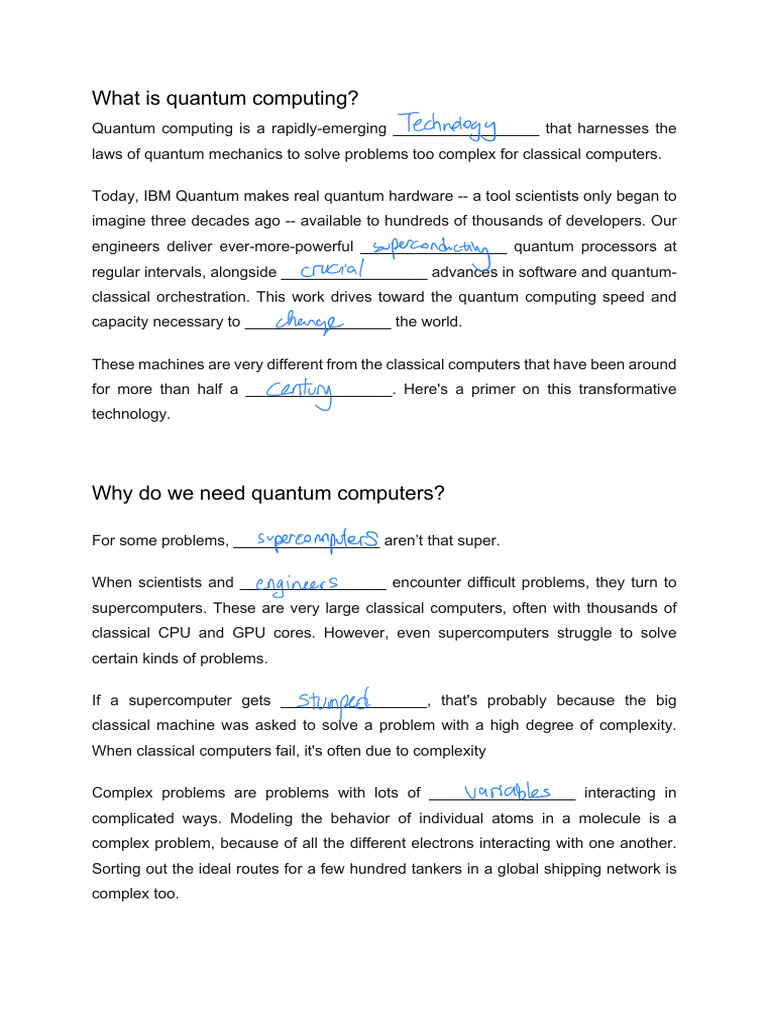Quantum computing stands at the precipice of a technological revolution. It harbors the potential to redefine the boundaries of computational capability, offering insights that traditional computing methods struggle to encapsulate. The allure of quantum computing is not merely rooted in its theoretical frameworks but is also fueled by its practical implications across numerous disciplines. This compendium will elucidate several pivotal topics in contemporary quantum computing research, each resonating with the underlying complexities and mysteries that physics presents.
1. Quantum Supremacy
One of the most exhilarating domains of quantum computing is the pursuit of quantum supremacy—the benchmark at which a quantum computer can solve problems beyond the reach of classical computers. This concept has captivated both scientists and technologists, marking a significant milestone in the evolution of computational technology. The inaugural demonstration of this phenomenon was achieved by Google in 2019 when their quantum processor, Sycamore, ostensibly performed a calculation in 200 seconds that would take the most advanced supercomputers approximately 10,000 years to complete. This astonishing feat provokes inquiries into the scalability and universality of quantum computing: can we harness this raw potential effectively across various applications, from cryptography to optimization problems?
2. Quantum Algorithms
The development of quantum algorithms remains a cornerstone of quantum computing research. Algorithms such as Shor’s and Grover’s have underscored quantum computing’s potential to exponentially accelerate specific computations. Shor’s algorithm poses a particular concern to classical cryptographic systems, revealing how quantum computers could factor large integers efficiently, thus undermining widely utilized encryption techniques. Conversely, Grover’s algorithm offers a quadratic speedup for unstructured search problems, prompting a reevaluation of computational complexity theory. Researchers are actively developing novel algorithms that exploit the unique properties of quantum superposition and entanglement, pushing towards realizing applications in artificial intelligence and machine learning.
3. Quantum Error Correction
The inherent fragility of quantum states poses a formidable challenge in the field: maintaining coherence in qubits long enough to perform reliable computations. Quantum error correction aims to mitigate decoherence and operational errors through codes that can detect and correct errors without measuring the quantum state directly. This research is vital for the implementation of scalable quantum computers. Notably, advancements such as surface codes and topological qubits provide promising avenues for constructing robust quantum systems. The intricate interplay of quantum mechanics and error correction embodies a significant engineering feat, merging the theoretical underpinnings of quantum physics with empirical technology.
4. Quantum Communication
Quantum communication leverages the principles of quantum mechanics to establish protocols that ensure secure information transfer. Quantum key distribution (QKD) exemplifies a practical application, permitting secure sharing of cryptographic keys. Protocols like BB84 exploit the properties of quantum entanglement to detect eavesdropping, assuring the integrity of the communication channel. Current research aims not only to refine these techniques for better efficiency but also to develop quantum networks that can interconnect quantum devices globally, enabling a new era of telecommunications. This endeavor raises philosophical questions about information security and trust in a quantum age.
5. Quantum Hardware Development
The architecture of quantum hardware represents an ongoing challenge in practical quantum computing applications. Various qubit technologies, such as superconducting qubits, trapped ions, and topological qubits, are being investigated. Each methodology focuses on balancing coherence time, gate speed, and coupling strengths. The race to miniaturize quantum processors while increasing their fidelity and scalability highlights the remarkable engineering feats that underpin this research area. Combining insights from condensed matter physics, materials science, and electrical engineering, researchers strive to fabricate quantum systems that can operate reliably in diverse environments.
6. Quantum Machine Learning
The fusion of quantum computing and machine learning juxtaposes two of the most transformative fields in technology today. Research in quantum machine learning (QML) seeks to harness quantum algorithms to enhance predictive modeling and data analysis. For instance, quantum-support vector machines and quantum neural networks propose novel frameworks for processing large datasets with unprecedented efficiency. By utilizing quantum states, these algorithms may significantly reduce the time required for tasks such as clustering and classification, suggesting that the paradigm shift could dramatically reshape industries ranging from finance to healthcare. However, the theoretical and practical challenges remain significant, as the integration of quantum technologies into everyday machine learning applications necessitates further exploration.
7. Quantum Simulation
Quantum simulation encapsulates one of the most promising applications of quantum computers—replicating quantum systems that are infeasible to model accurately with classical computational methods. From simulating complex molecules in drug development to investigating high-energy quantum systems, quantum simulation enables researchers to probe realms once deemed inaccessible. This research point not only bears implications for basic science but also catalyzes advancements in materials science, condensed matter physics, and beyond. The capability to analyze quantum systems in this manner fosters a deeper understanding of phenomena such as superconductivity, which holds potential for technological evolution.
In summary, quantum computing research propels a multitude of topics that resonate across various scientific and technological disciplines. The quest to unravel and harness the complexities of quantum mechanics encapsulates humanity’s continued pursuit of knowledge, nudging us closer to a future replete with possibilities barely dreamt of a few decades ago. As we navigate this fascinating landscape, the interplay of theory, experimentation, and practical application promises to unveil profound insights—not merely about computing, but about the universe itself.












